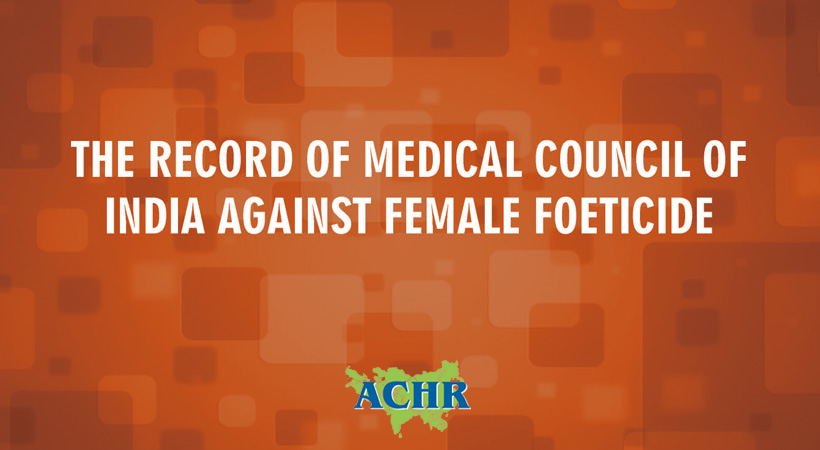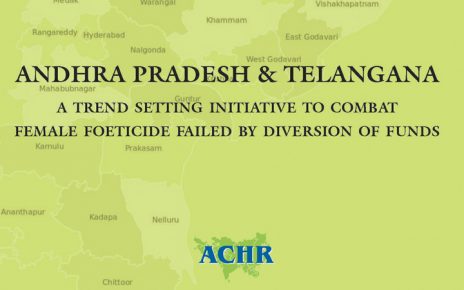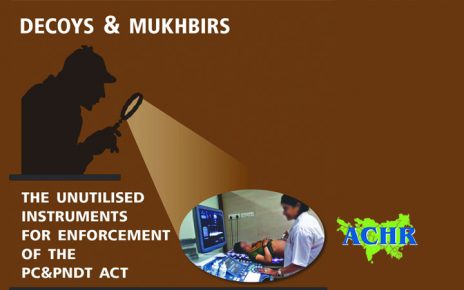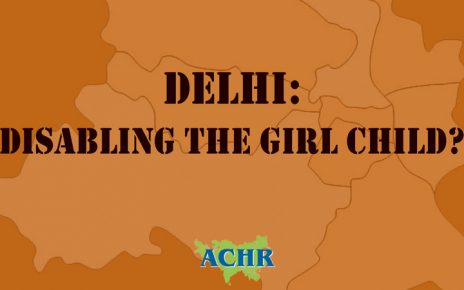The problem of female foeticide or sex selection in India is acute in India. The invention of technology i.e. ultrasonography for pre-natal sex determination in 1980s replaced intentional killing of infant girls with sex selective abortion of female foetuses. Since 1990s various studies recognised female infanticide as a serious problem with reduction of women in comparison to men. The collusion of technology and traditions caused missing of millions girls through female infanticide.
Female foeticide is mostly committed with the participation of the medical professionals and the role of the Medical Council of India (MCI) and relevant State Medical Councils is critical for the effective implementation of the Preconception and Pre-Natal Diagnostic Techniques (Prohibition of Sex Selection) Act, 1994 (PC&PNDT Act). As per Section 23(2) of the PC&PNDT Act, the Appropriate Authorities (AAs) are required to report the name of medical practitioner/s against whom charge under the Act has been framed to respective State Medical Council for taking necessary action including suspension of the registration if the charges are framed by the court and till the case is disposed of, and on conviction for removal of his name from the registrar of the Council for a period of five years for the first offence and permanently for the subsequent offence.
According to the National Crimes Record Bureau (NCRB), from 2002 to 2012, the trials of 218 cases were completed resulting in conviction in 55 cases and acquittal in 163 cases. However, the MCI was not known to have taken any action against any medical professional. On 4 June 2011, India’s then Health Minister Ghulam Nabi Azad had stated: “The Medical Council of India should take cognizance of practice of illegal sex selection, determination and sex selective abortion and ensure that guidelines for accreditation of training and experience for medical practitioners are put in place quickly. MCI should also make sure that registration of medical professionals found guilty of violation under the PC&PNDT Act is suspended or cancelled immediately in accordance with the provisions of the Act”.
There are major problems in the implementation of the PC&PNDT Act especially by the medical professionals. Minister of State, Ministry of Health and Family Welfare, Smt. Anupriya Patel in Unstarred Question No. 1116 answered 21 July 2017 informed the Lok Sabha that as per Quarterly Progress Reports (QPRs) ending March 2017, 416 convictions were secured under the PC&PNDT Act but only 114 medical licenses were cancelled/suspended. This shows that corollary action for cancellation or suspension of medical licenses of 302 medical professionals had not taken place despite conviction by the courts. Further, as per the QPRs 1,762 machines were sealed and seized for violations of the PC&PNDT Act and 2,371 court cases were pending as in March 2017. It is expected in many of the 2,371 cases charges have been framed but corollary action for suspension of medical licenses had not taken place after framing of charges.
As per 2011 Census, 10 States registered worst CSR. These included Haryana (834), Punjab (846), Jammu & Kashmir (862), Delhi (871), Chandigarh (880), Rajasthan (888), Uttarakhand (890), Gujarat (890), Maharashtra (894) and Uttar Pradesh (902). Chandigarh despite low CSR of 880 had one pending case and no conviction reported as in March 2017.
Among the 10 States with the worst CSR, with respect to taking actions against the medical professionals, Rajasthan registered the highest conviction with 145, followed by Maharashtra (88), Haryana (69), Punjab (31), Tamil Nadu (18), Gujarat and Delhi (17 each), Uttar Pradesh (12), Bihar (6), Madhya Pradesh and Odisha (3 each), Telengana (2), and Assam, Chhattisgarh, Himachal Pradesh, Jammu & Kashmir and Uttarakhand (1 each).
In terms of cancellation of licenses, Maharashtra topped with 69 cases, followed by Rajasthan (21), Haryana (14), and Gujarat (5), Punjab (1) and Uttar Pradesh (1). The remaining four among top 10 States with the worst CSR i.e. Bihar, Delhi, Jammu and Kashmir and Uttarakhand did not report any cancellation of doctor’s licenses.
The States/UTs which registered no conviction included Andhra Pradesh, Arunachal Pradesh, Goa, Jharkhand, Karnataka, Kerala, Manipur, Meghalaya, Mizoram, Nagaland, Sikkim, Tripura, West Bengal, Andaman & Nicobar Island, Chandigarh, Dadra & Nagar Haveli, Daman & Diu, Lakswadeep, and Puducherry. Of these, some States have pending cases and some machines were sealed/seized.
At present, the requirement of the Section 23(2) of the PC&PNDT Act that the Appropriate Authorities (AAs) will report the name of medical practitioner against whom charge has been framed to respective State Medical Council for taking necessary action including suspension of the registration if the charges are framed by the court and till the case is disposed of and on conviction for removal of his name from the registrar of the Council for a period of five years for the first offence and permanently for the subsequent offence is caught in the bureaucratic red-tape. There is an urgent need for addressing this systemic flaw by amending the PC&PNDT Rules to require the AAs to inform the Central Supervisory Board within four weeks of framing of charges and/or conviction of medical professionals which shall follow up with the MCI or State Medical Councils to ensure compliance with the Act.




